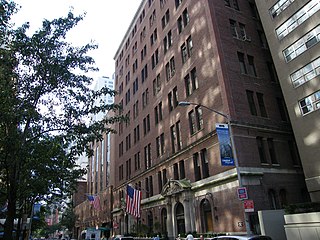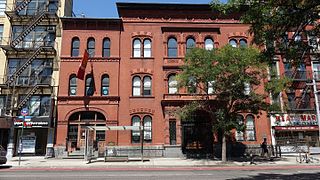
The Animal Medical Center of New York, formally the Schwarzman Animal Medical Center, is a non profit animal hospital in New York City and the largest non-profit animal hospital in the world. [1]

The Animal Medical Center of New York, formally the Schwarzman Animal Medical Center, is a non profit animal hospital in New York City and the largest non-profit animal hospital in the world. [1]
The center began in 1906 when Ellin Prince Speyer founded the "Women's Auxiliary to the American Society for the Prevention of Cruelty to Animals". The first major activity organized was the Work Horse Parade held on Memorial Day in 1907 in New York City. [2]
In 1909 the Women's Auxiliary decided to establish a dispensary and out-patient clinic for all animals whose owners could not afford to pay for medical treatment. The clinic opened in 1910 on the Lower East Side of Manhattan. Veterinarians volunteered their services on a part-time basis. The clinic treated 6,028 animals in the first full year. [2]
On May 12, 1910, the Women's Auxiliary separated from the Society for the Prevention of Cruelty to Animals and they incorporated themselves as the "New York Women's League for Animals". [2]

The "Hospital of the New York Women's League for Animals" was established in 1914 at 350 Lafayette Street in New York City with Bruce Blair as the resident veterinarian. [2] [3] The hospital was renamed the Ellin Prince Speyer Free Hospital for Animals in 1921 after the death of the founder.
In 1959 the League voted to change the name to the "Animal Medical Center". In January 1960 construction began on a $4 million facility on 62nd Street on the East River. In 1962 it opened to the public. [2]
As of 2023, Helen Irving was President and the hospital was undergoing a large renovation and expansion to meet increased demand and technologies in animal care. [4] [1] [5]
The American Society for the Prevention of Cruelty to Animals (ASPCA) is a non-profit organization dedicated to preventing animal cruelty. Based in New York City since its inception in 1866, the organization's mission is "to provide effective means for the prevention of cruelty to animals throughout the United States."

A veterinarian (vet) or veterinary surgeon is a medical professional who practices veterinary medicine. They manage a wide range of health conditions and injuries in non-human animals. Along with this, veterinarians also play a role in animal reproduction, health management, conservation, husbandry and breeding and preventive medicine like nutrition, vaccination and parasitic control as well as biosecurity and zoonotic disease surveillance and prevention.

Stephen Allen Schwarzman is an American businessman. He is the chairman and CEO of the Blackstone Group, a global private equity firm he established in 1985 with Peter G. Peterson. Schwarzman was chairman of former President Donald Trump's Strategic and Policy Forum.
The NewYork-Presbyterian Hospital is a nonprofit academic medical center in New York City. It is the primary teaching hospital for Weill Cornell Medicine and Columbia University College of Physicians and Surgeons. The hospital includes seven campuses located throughout the New York metropolitan area. The hospital's two flagship medical centers, Columbia University Irving Medical Center and Weill Cornell Medical Center, are located on opposite sides of Upper Manhattan.

Lenox Hill Hospital (LHH) is a nationally ranked 450-bed non-profit, tertiary, research and academic medical center located on the Upper East Side of Manhattan in New York City, servicing the tri-state area. LHH is one of the region's many university-level academic medical centers. The hospital is owned by Northwell Health, the largest private employer in the state of New York. LHH serves as a clinical campus for the Zucker School of Medicine, which is owned by the health system in a partnership with Hofstra University.

Manhattan Eye, Ear and Throat Hospital (MEETH) is a specialty hospital in New York City that was founded in 1869 and is currently located on the Upper East Side of Manhattan at 210 East 64th Street. After 131 years as an independent entity, in 2000 MEETH affiliated with Lenox Hill Hospital, a 652-bed acute care hospital, established in New York City in 1857 and located at 77th Street in Manhattan. MEETH is recognized in medical circles for its long history of contributions in developing the fields of ophthalmology, otolaryngology and plastic surgery. MEETH provides thousands of patients a year with treatment in its ambulatory surgery facilities.

New York-Presbyterian Lower Manhattan Hospital is a nonprofit, acute care, teaching hospital in New York City and is the only hospital in Lower Manhattan south of Greenwich Village. It is part of the New York-Presbyterian Healthcare System and one of the main campuses of New York-Presbyterian Hospital.
The Blue Cross of India (BCI) is an animal welfare charity based in Chennai, India. It was established in 1959 by Captain V. Sundaram, his wife Usha and their three children, in Chennai. The society was formally registered in 1964 under the Societies Registration Act. The nine signatories to the Articles and Memorandum of Association were Captain V. Sundaram, Usha Sundaram, S. Chinny Krishna, Suresh Sundaram, S. Vijayalakshmi, D. Daivasigamony, Kamakshi Krishnamoorthi, Sundari Nataraj and T. V. Chandrasekhar. It is now one of the country's largest animal welfare organisations. It runs several animal welfare programs including animal rights awareness.

St. Luke's Medical Center (SLMC) is a private non-profit health care institution based in Quezon City, Metro Manila, Philippines which operates two hospitals of the same name in Quezon City and Taguig.

The Massachusetts Society for the Prevention of Cruelty to Animals-Angell Animal Medical Center (MSPCA-Angell) is a 501(c)(3) non-profit organization with its main headquarters on South Huntington Avenue in the Jamaica Plain neighborhood of Boston, Massachusetts. It was founded in 1868, and is the second-oldest humane society in the United States. "MSPCA-Angell" was adopted as the society's identity in 2003, and indicates the names of its two closely related predecessor organizations: Massachusetts Society for the Prevention of Cruelty to Animals and Angell Animal Medical Center. The organization provides direct care to thousands of homeless, injured, and abused animals each year, and provides animal adoption, a veterinary hospital, advocacy, and humane law enforcement.

The Ottendorfer Public Library and Stuyvesant Polyclinic Hospital are a pair of historic buildings at 135 and 137 Second Avenue in the East Village neighborhood of Manhattan in New York City. The buildings house the Ottendorfer Branch of the New York Public Library, as well as the women's workspace The Wing within the former Stuyvesant Polyclinic hospital.

Ellin Leslie Prince Lowery Speyer was an American philanthropist and animal welfare activist.
Manhattan General Hospital is a defunct hospital that also used the name Manhattan Hospital and relocated more than once, using buildings that serially served more than one hospital, beginning in the 1920s.

Caroline White was an American philanthropist and anti-vivisection activist. She co-founded the Pennsylvania Society for the Prevention of Cruelty to Animals (PSPCA) in 1867, founded its women's branch (WPSPCA) in 1869, and founded the American Anti-Vivisection Society (AAVS) in 1883.

Presbyterian Hospital was a New York City hospital. It was founded in 1868 and began operations in 1872. It was originally located between East 70th Street and 71st Streets and Madison and Park Avenue. The hospital expanded continuously throughout the late 19th century, adding an outpatient dispensary in 1888, a school of nursing in 1892, and additional beds and services in 1892, 1893, 1904 and 1912.
The British Columbia Society for the Prevention of Cruelty to Animals is a non-profit animal welfare organization which advocates for animal protection legislation, operates animal shelters, and runs educational workshops and public awareness programs throughout British Columbia, Canada. Founded in 1896, it is a registered charitable organization and one of the largest such animal welfare organizations in North America. As of 2017, BC SPCA had 36 branches, over 500 staff members, nearly 5500 volunteers, operated 5 veterinary hospitals/clinics and a wildlife rehabilitation centre, and sheltered more than 22000 animals. It is also one of the few animal welfare organizations to monitor animals in film.
The Wild Bird Fund is a non-profit animal hospital on the Upper West Side of Manhattan in New York City. It is the city's first and only wild animal hospital.
The New York Women's League for Animals held the formal opening yesterday of its new Free Hospital and Dispensary for Animals, at 350 Lafayette Street. By 3:30 o'clock, the hour set for the opening, the main ward of the hospital, on the second floor, which is really a large corridor, with box and plain stalls along the sides for horses, was quite filled with guests, who cheerfully occupied camp chairs placed in the various stalls. ...